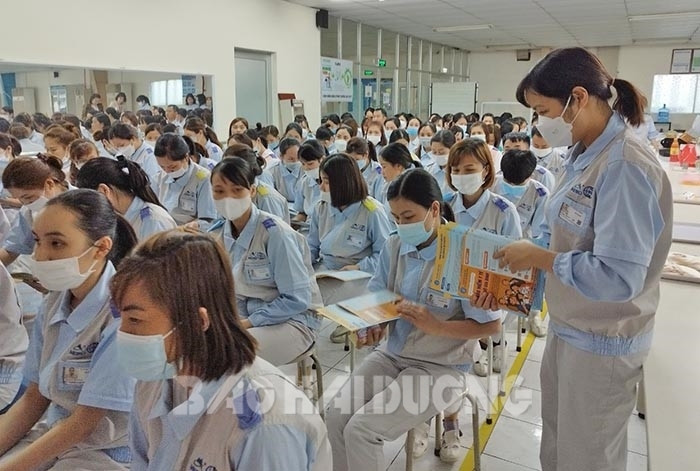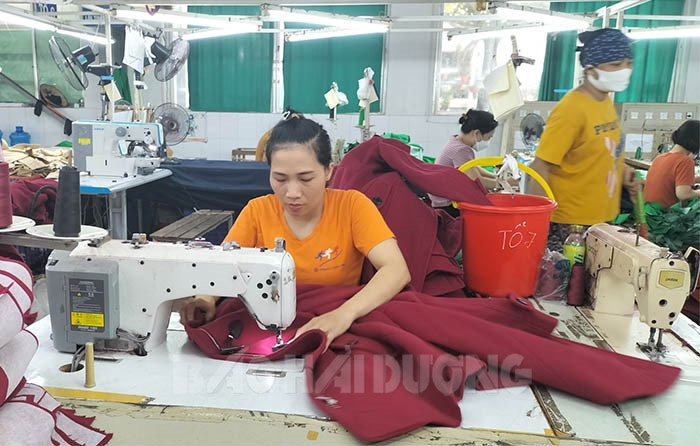Although workers have access to many sources of information on reproductive health care, if they do not know how to choose, they can easily be at risk.

The Trade Union of Meiko Towada Vietnam Co., Ltd. distributed leaflets on reproductive health to workers and laborers.
Photo: DIEU THUY
Although workers and laborers now have access to many sources of information on reproductive health care, if they do not know how to select and do not receive attention from businesses, they can easily encounter risks.
Blurry
Although half a year has passed, Ms. Lu Thi Th. from Tam Duong district (Lai Chau) is still haunted by the trauma of her first abortion. This year, Ms. Th. is 19 years old and has been working in Hai Duong for 2 years in an electronic components manufacturing company in Phuc Dien industrial park (Cam Giang). Ms. Th. and her boyfriend both went to Hai Duong to work, but due to carelessness, they got pregnant unintentionally. “I was afraid my family would find out so I hid it and went to have an abortion at a private clinic on Nguyen Trai street (Hai Duong city). After the abortion, I was supposed to not do heavy work, ensure nutrition and not have sex right away, but due to lack of knowledge, I did not follow the doctor's instructions. As a result, I bled so much that I had to go to the emergency room 2 days after the abortion.”
After many years of working on reproductive health communication for workers and laborers, many officials of the Department of Population and Family Planning believe that although knowledge about reproductive health is widespread, there is not much information for workers and laborers to choose good information. They are afraid to go to specialized reproductive health care centers for regular check-ups. Many people believe in "Doctor Google" to buy medicine to treat themselves, causing them to lose money and suffer. Many workers and laborers also do not take reproductive health seriously. Sometimes, because they are afraid, they do not share with their relatives, do not take the initiative to have regular medical check-ups, so when they discover the disease, it is already serious and difficult to treat.
Ethnic minority workers working in Hai Duong enterprises still lack much information about reproductive health. They often do not use scientific and safe contraceptive methods, and even use certain types of tobacco to treat diseases, leading to serious infections, which significantly affect reproductive health. Ms. Nguyen Thi Than, a worker at TRIX Vietnam Co., Ltd. in Phuc Dien Industrial Park (Cam Giang) admitted that she is not interested in learning about reproductive health knowledge. "The company also organizes propaganda about reproductive health knowledge, but the time for studying is too short, so they forget what they learn," Ms. Than shared.
Need to compensate
Hai Duong currently has more than 350,000 employees working in enterprises inside and outside industrial zones. Laborers of childbearing age working in enterprises also account for a fairly high proportion, about more than 80%. Therefore, taking care of reproductive health for employees is of great significance to improve union member welfare, helping enterprises have good human resources to serve production and business.
Ms. Ha Thi Thu Ha, Head of the Labor Union (in charge of salary and welfare policies for employees), Vice President of the Labor Union of YODY Fashion Joint Stock Company (Hai Duong City) said that the company has more than 3,000 employees, of which 85% are female, so taking care of women's reproductive health is of great concern. Knowledge about reproductive health is regularly provided through the women's union. In addition to enjoying the prescribed benefits, women of childbearing age are also provided with separate uniforms by the company to suit their pregnancy. Realizing that reproductive health care is not only important for women but also for men, the company is working with a center to set up a hotline to provide advice on love, gender knowledge, and health for workers anytime, anywhere, thereby helping them gain more knowledge about health care.
Healthy workers also benefit businesses. This is the opinion of Ms. Nguyen Thi Hang, in charge of women's work at Tien An Garment Joint Stock Company in Lien Hong Commune (Hai Duong City). According to Ms. Hang, in addition to complying with the schedule of periodic health check-ups for workers, businesses also care about sharing and supporting workers and laborers in their marriage and family life, including issues related to reproductive health. "Many women are affected by the prejudice of their families and clans that they have a third child while their income is not high and their health is limited. In these cases, we and our colleagues in the group often learn and advise, even go to the family's house to mobilize them," said Ms. Hang.

The proportion of workers of childbearing age working in enterprises in the province is very large, so it is necessary to equip them with reproductive health knowledge. Illustrative photo
Currently, the budget for propaganda work on population in general and reproductive health for workers and laborers in particular in the province is quite limited. Some models such as "Friendly Corner" of Hai Duong Provincial Youth Union or "Workers and Laborers with Reproductive Health" Club implemented by the Vietnam Family Planning Association, built as a pilot in some enterprises that have been operating for a long time, have gradually faded away.
Reproductive health care is of great significance to the lives of workers and laborers, so it requires the attention of enterprises and trade unions. Communication activities and provision of knowledge about reproductive health need to be organized regularly. Reproductive health care models with such significance need to change their methods of operation, avoid being established and then left there, dying young while workers are still ignorant about reproductive health knowledge.
BAO ANH
>>> Promote propaganda and dissemination of knowledge about population and reproductive health for students
>>> Consequences of lack of knowledge about reproductive health
>>> Ensuring information on reproductive health care and family planning during the pandemic